Episode of Care for a Patient with Parkinson's Disease and Vascular Dementia
VerifiedAdded on 2022/11/15
|14
|4943
|459
AI Summary
This essay discusses the episode of care for a 71-year-old patient with Parkinson's disease and vascular dementia. It highlights the importance of building a therapeutic relationship, the six C's of nursing care, and the role of communication, compassion, and competency in providing effective care. The essay also explores the ethical principles of nursing and the challenges faced in providing care to dementia patients.
Contribute Materials
Your contribution can guide someone’s learning journey. Share your
documents today.
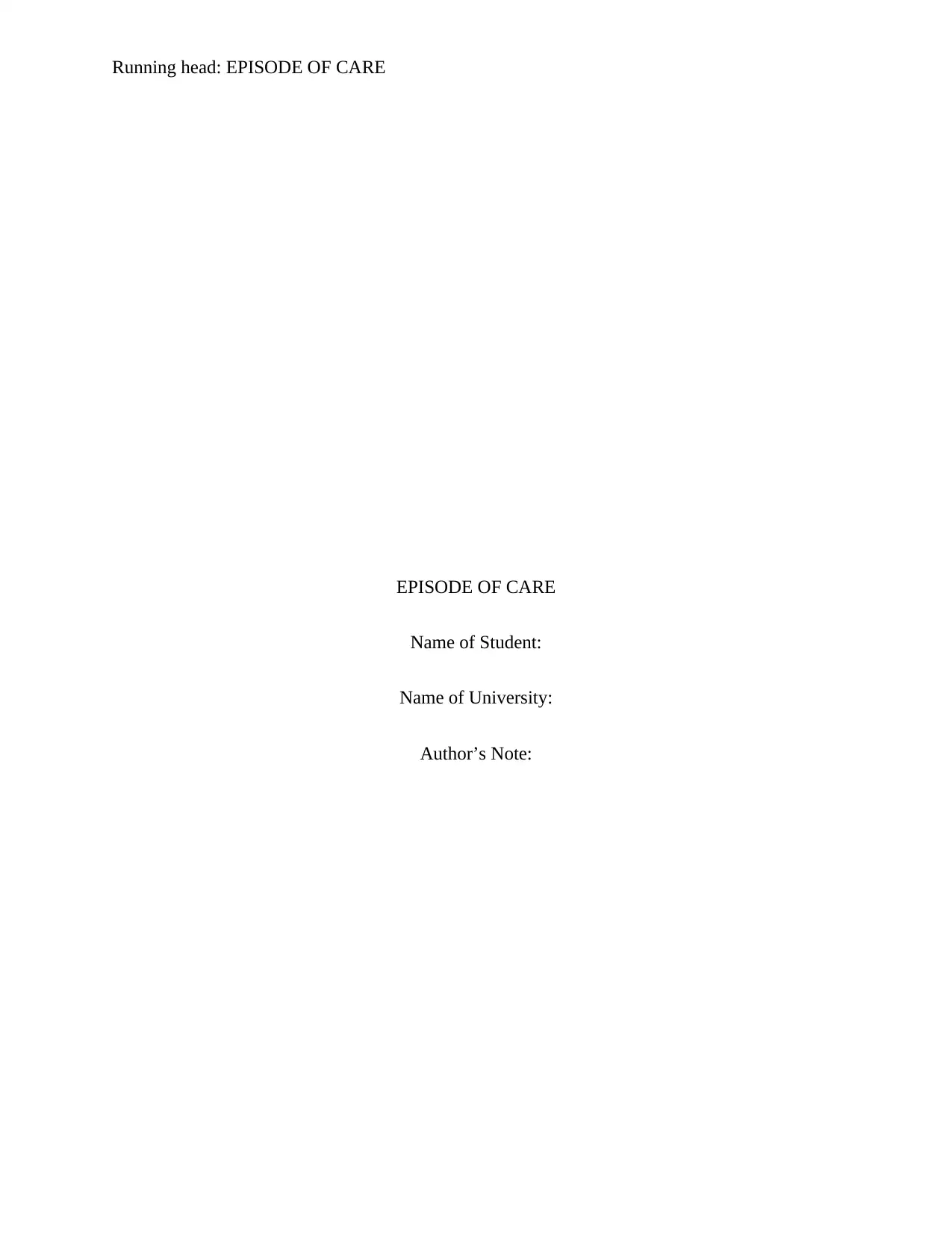
Running head: EPISODE OF CARE
EPISODE OF CARE
Name of Student:
Name of University:
Author’s Note:
EPISODE OF CARE
Name of Student:
Name of University:
Author’s Note:
Secure Best Marks with AI Grader
Need help grading? Try our AI Grader for instant feedback on your assignments.
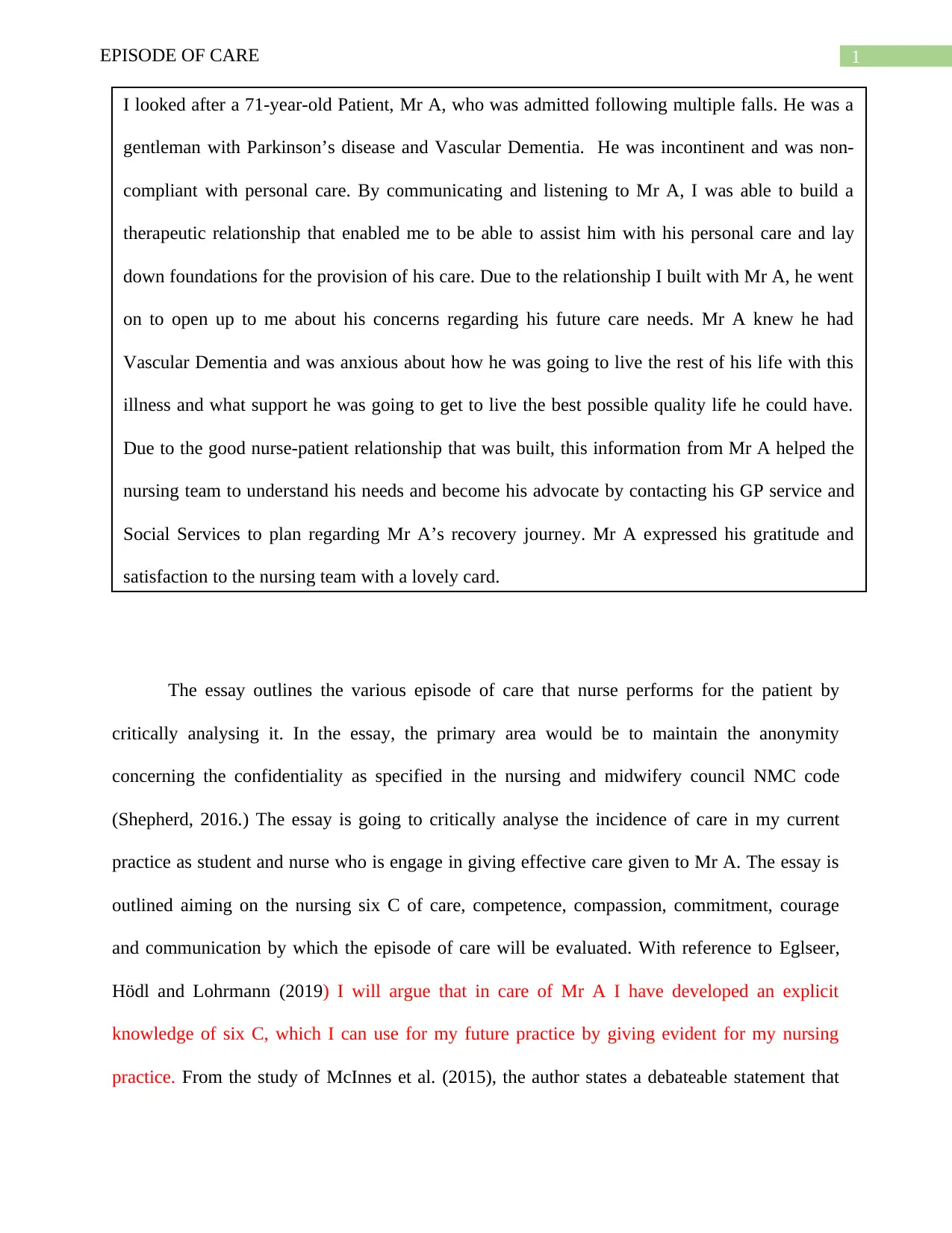
1EPISODE OF CARE
Introduction
The essay outlines the various episode of care that nurse performs for the patient by
critically analysing it. In the essay, the primary area would be to maintain the anonymity
concerning the confidentiality as specified in the nursing and midwifery council NMC code
(Shepherd, 2016.) The essay is going to critically analyse the incidence of care in my current
practice as student and nurse who is engage in giving effective care given to Mr A. The essay is
outlined aiming on the nursing six C of care, competence, compassion, commitment, courage
and communication by which the episode of care will be evaluated. With reference to Eglseer,
Hödl and Lohrmann (2019) I will argue that in care of Mr A I have developed an explicit
knowledge of six C, which I can use for my future practice by giving evident for my nursing
practice. From the study of McInnes et al. (2015), the author states a debateable statement that
I looked after a 71-year-old Patient, Mr A, who was admitted following multiple falls. He was a
gentleman with Parkinson’s disease and Vascular Dementia. He was incontinent and was non-
compliant with personal care. By communicating and listening to Mr A, I was able to build a
therapeutic relationship that enabled me to be able to assist him with his personal care and lay
down foundations for the provision of his care. Due to the relationship I built with Mr A, he went
on to open up to me about his concerns regarding his future care needs. Mr A knew he had
Vascular Dementia and was anxious about how he was going to live the rest of his life with this
illness and what support he was going to get to live the best possible quality life he could have.
Due to the good nurse-patient relationship that was built, this information from Mr A helped the
nursing team to understand his needs and become his advocate by contacting his GP service and
Social Services to plan regarding Mr A’s recovery journey. Mr A expressed his gratitude and
satisfaction to the nursing team with a lovely card.
Introduction
The essay outlines the various episode of care that nurse performs for the patient by
critically analysing it. In the essay, the primary area would be to maintain the anonymity
concerning the confidentiality as specified in the nursing and midwifery council NMC code
(Shepherd, 2016.) The essay is going to critically analyse the incidence of care in my current
practice as student and nurse who is engage in giving effective care given to Mr A. The essay is
outlined aiming on the nursing six C of care, competence, compassion, commitment, courage
and communication by which the episode of care will be evaluated. With reference to Eglseer,
Hödl and Lohrmann (2019) I will argue that in care of Mr A I have developed an explicit
knowledge of six C, which I can use for my future practice by giving evident for my nursing
practice. From the study of McInnes et al. (2015), the author states a debateable statement that
I looked after a 71-year-old Patient, Mr A, who was admitted following multiple falls. He was a
gentleman with Parkinson’s disease and Vascular Dementia. He was incontinent and was non-
compliant with personal care. By communicating and listening to Mr A, I was able to build a
therapeutic relationship that enabled me to be able to assist him with his personal care and lay
down foundations for the provision of his care. Due to the relationship I built with Mr A, he went
on to open up to me about his concerns regarding his future care needs. Mr A knew he had
Vascular Dementia and was anxious about how he was going to live the rest of his life with this
illness and what support he was going to get to live the best possible quality life he could have.
Due to the good nurse-patient relationship that was built, this information from Mr A helped the
nursing team to understand his needs and become his advocate by contacting his GP service and
Social Services to plan regarding Mr A’s recovery journey. Mr A expressed his gratitude and
satisfaction to the nursing team with a lovely card.
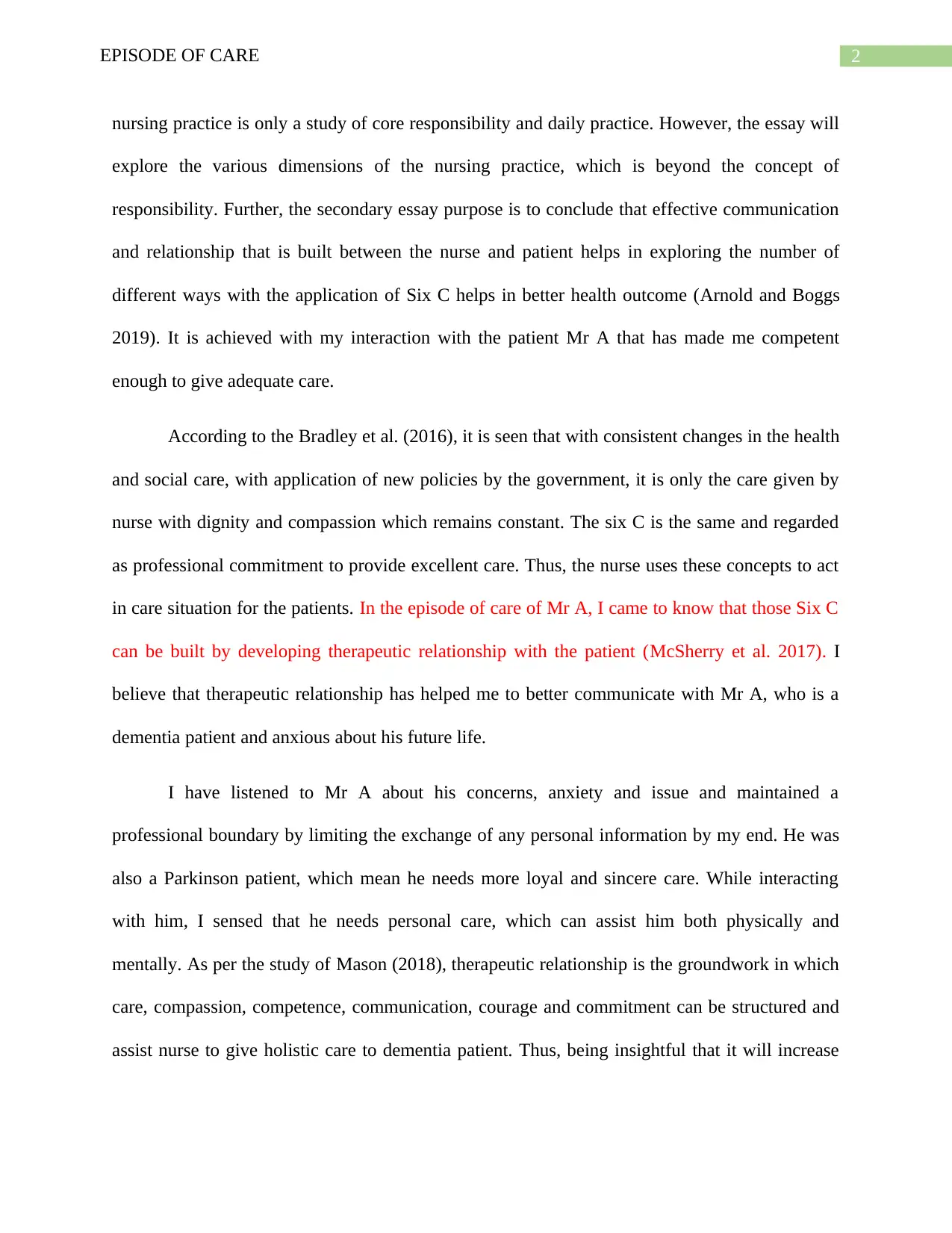
2EPISODE OF CARE
nursing practice is only a study of core responsibility and daily practice. However, the essay will
explore the various dimensions of the nursing practice, which is beyond the concept of
responsibility. Further, the secondary essay purpose is to conclude that effective communication
and relationship that is built between the nurse and patient helps in exploring the number of
different ways with the application of Six C helps in better health outcome (Arnold and Boggs
2019). It is achieved with my interaction with the patient Mr A that has made me competent
enough to give adequate care.
According to the Bradley et al. (2016), it is seen that with consistent changes in the health
and social care, with application of new policies by the government, it is only the care given by
nurse with dignity and compassion which remains constant. The six C is the same and regarded
as professional commitment to provide excellent care. Thus, the nurse uses these concepts to act
in care situation for the patients. In the episode of care of Mr A, I came to know that those Six C
can be built by developing therapeutic relationship with the patient (McSherry et al. 2017). I
believe that therapeutic relationship has helped me to better communicate with Mr A, who is a
dementia patient and anxious about his future life.
I have listened to Mr A about his concerns, anxiety and issue and maintained a
professional boundary by limiting the exchange of any personal information by my end. He was
also a Parkinson patient, which mean he needs more loyal and sincere care. While interacting
with him, I sensed that he needs personal care, which can assist him both physically and
mentally. As per the study of Mason (2018), therapeutic relationship is the groundwork in which
care, compassion, competence, communication, courage and commitment can be structured and
assist nurse to give holistic care to dementia patient. Thus, being insightful that it will increase
nursing practice is only a study of core responsibility and daily practice. However, the essay will
explore the various dimensions of the nursing practice, which is beyond the concept of
responsibility. Further, the secondary essay purpose is to conclude that effective communication
and relationship that is built between the nurse and patient helps in exploring the number of
different ways with the application of Six C helps in better health outcome (Arnold and Boggs
2019). It is achieved with my interaction with the patient Mr A that has made me competent
enough to give adequate care.
According to the Bradley et al. (2016), it is seen that with consistent changes in the health
and social care, with application of new policies by the government, it is only the care given by
nurse with dignity and compassion which remains constant. The six C is the same and regarded
as professional commitment to provide excellent care. Thus, the nurse uses these concepts to act
in care situation for the patients. In the episode of care of Mr A, I came to know that those Six C
can be built by developing therapeutic relationship with the patient (McSherry et al. 2017). I
believe that therapeutic relationship has helped me to better communicate with Mr A, who is a
dementia patient and anxious about his future life.
I have listened to Mr A about his concerns, anxiety and issue and maintained a
professional boundary by limiting the exchange of any personal information by my end. He was
also a Parkinson patient, which mean he needs more loyal and sincere care. While interacting
with him, I sensed that he needs personal care, which can assist him both physically and
mentally. As per the study of Mason (2018), therapeutic relationship is the groundwork in which
care, compassion, competence, communication, courage and commitment can be structured and
assist nurse to give holistic care to dementia patient. Thus, being insightful that it will increase
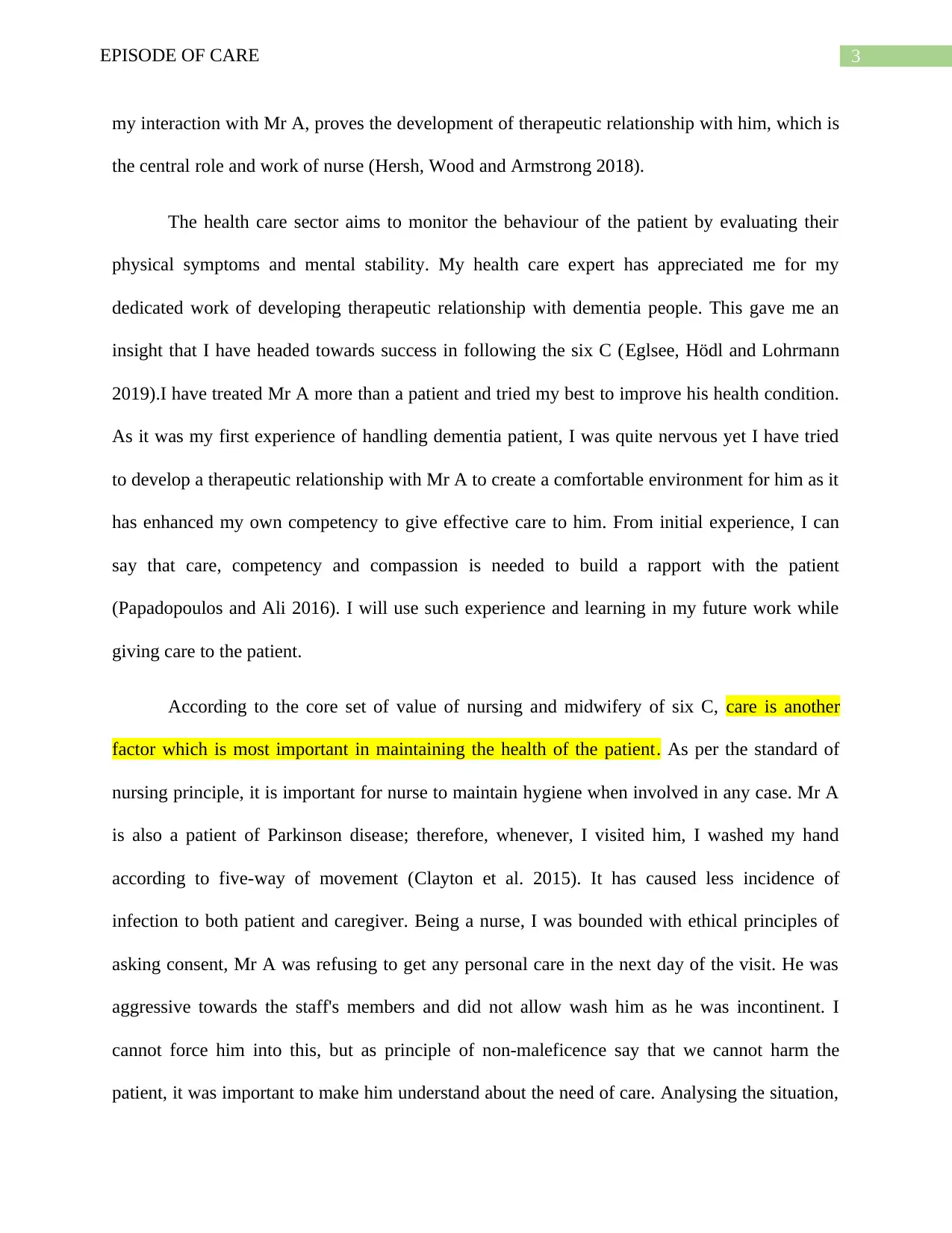
3EPISODE OF CARE
my interaction with Mr A, proves the development of therapeutic relationship with him, which is
the central role and work of nurse (Hersh, Wood and Armstrong 2018).
The health care sector aims to monitor the behaviour of the patient by evaluating their
physical symptoms and mental stability. My health care expert has appreciated me for my
dedicated work of developing therapeutic relationship with dementia people. This gave me an
insight that I have headed towards success in following the six C (Eglsee, Hödl and Lohrmann
2019).I have treated Mr A more than a patient and tried my best to improve his health condition.
As it was my first experience of handling dementia patient, I was quite nervous yet I have tried
to develop a therapeutic relationship with Mr A to create a comfortable environment for him as it
has enhanced my own competency to give effective care to him. From initial experience, I can
say that care, competency and compassion is needed to build a rapport with the patient
(Papadopoulos and Ali 2016). I will use such experience and learning in my future work while
giving care to the patient.
According to the core set of value of nursing and midwifery of six C, care is another
factor which is most important in maintaining the health of the patient. As per the standard of
nursing principle, it is important for nurse to maintain hygiene when involved in any case. Mr A
is also a patient of Parkinson disease; therefore, whenever, I visited him, I washed my hand
according to five-way of movement (Clayton et al. 2015). It has caused less incidence of
infection to both patient and caregiver. Being a nurse, I was bounded with ethical principles of
asking consent, Mr A was refusing to get any personal care in the next day of the visit. He was
aggressive towards the staff's members and did not allow wash him as he was incontinent. I
cannot force him into this, but as principle of non-maleficence say that we cannot harm the
patient, it was important to make him understand about the need of care. Analysing the situation,
my interaction with Mr A, proves the development of therapeutic relationship with him, which is
the central role and work of nurse (Hersh, Wood and Armstrong 2018).
The health care sector aims to monitor the behaviour of the patient by evaluating their
physical symptoms and mental stability. My health care expert has appreciated me for my
dedicated work of developing therapeutic relationship with dementia people. This gave me an
insight that I have headed towards success in following the six C (Eglsee, Hödl and Lohrmann
2019).I have treated Mr A more than a patient and tried my best to improve his health condition.
As it was my first experience of handling dementia patient, I was quite nervous yet I have tried
to develop a therapeutic relationship with Mr A to create a comfortable environment for him as it
has enhanced my own competency to give effective care to him. From initial experience, I can
say that care, competency and compassion is needed to build a rapport with the patient
(Papadopoulos and Ali 2016). I will use such experience and learning in my future work while
giving care to the patient.
According to the core set of value of nursing and midwifery of six C, care is another
factor which is most important in maintaining the health of the patient. As per the standard of
nursing principle, it is important for nurse to maintain hygiene when involved in any case. Mr A
is also a patient of Parkinson disease; therefore, whenever, I visited him, I washed my hand
according to five-way of movement (Clayton et al. 2015). It has caused less incidence of
infection to both patient and caregiver. Being a nurse, I was bounded with ethical principles of
asking consent, Mr A was refusing to get any personal care in the next day of the visit. He was
aggressive towards the staff's members and did not allow wash him as he was incontinent. I
cannot force him into this, but as principle of non-maleficence say that we cannot harm the
patient, it was important to make him understand about the need of care. Analysing the situation,
Secure Best Marks with AI Grader
Need help grading? Try our AI Grader for instant feedback on your assignments.
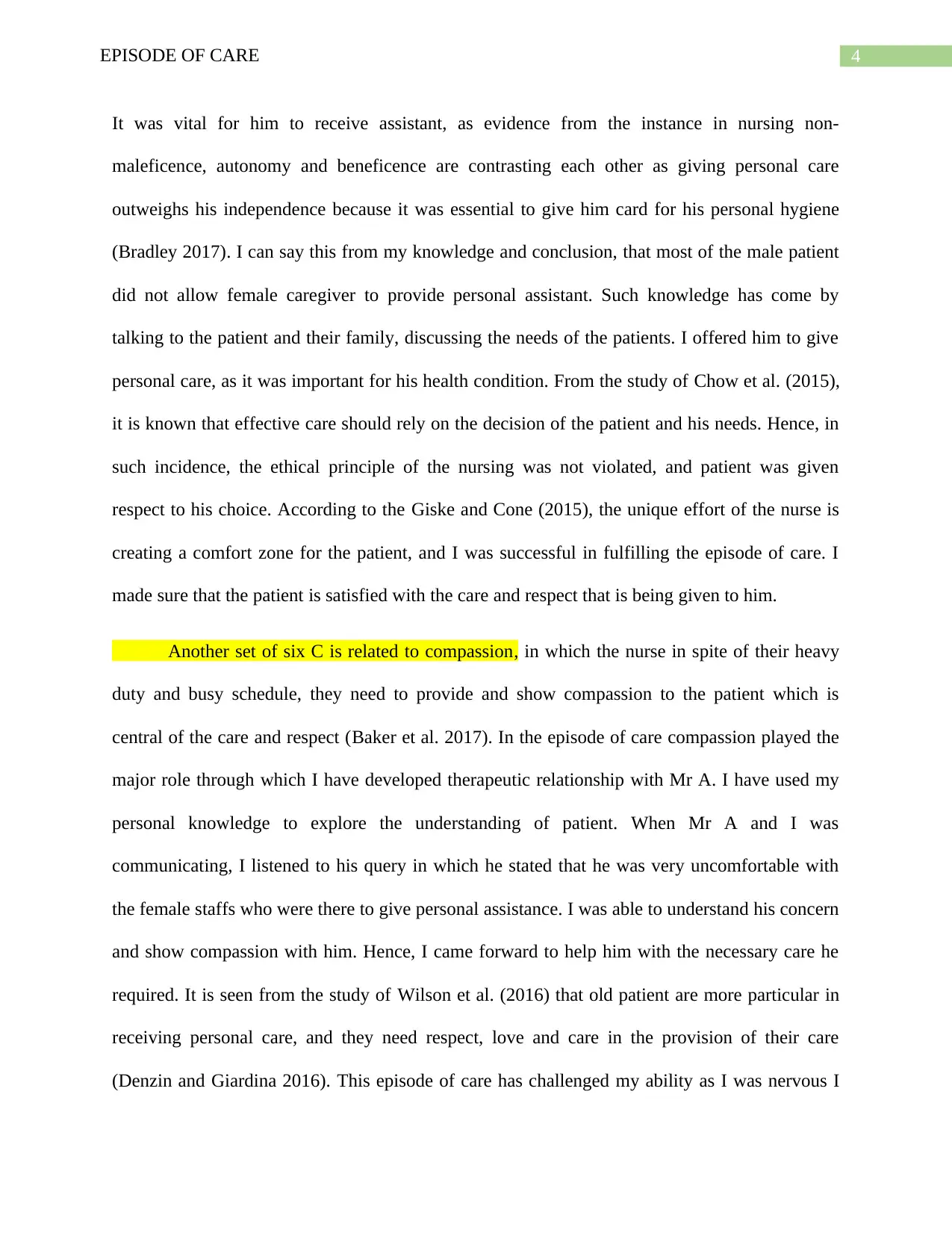
4EPISODE OF CARE
It was vital for him to receive assistant, as evidence from the instance in nursing non-
maleficence, autonomy and beneficence are contrasting each other as giving personal care
outweighs his independence because it was essential to give him card for his personal hygiene
(Bradley 2017). I can say this from my knowledge and conclusion, that most of the male patient
did not allow female caregiver to provide personal assistant. Such knowledge has come by
talking to the patient and their family, discussing the needs of the patients. I offered him to give
personal care, as it was important for his health condition. From the study of Chow et al. (2015),
it is known that effective care should rely on the decision of the patient and his needs. Hence, in
such incidence, the ethical principle of the nursing was not violated, and patient was given
respect to his choice. According to the Giske and Cone (2015), the unique effort of the nurse is
creating a comfort zone for the patient, and I was successful in fulfilling the episode of care. I
made sure that the patient is satisfied with the care and respect that is being given to him.
Another set of six C is related to compassion, in which the nurse in spite of their heavy
duty and busy schedule, they need to provide and show compassion to the patient which is
central of the care and respect (Baker et al. 2017). In the episode of care compassion played the
major role through which I have developed therapeutic relationship with Mr A. I have used my
personal knowledge to explore the understanding of patient. When Mr A and I was
communicating, I listened to his query in which he stated that he was very uncomfortable with
the female staffs who were there to give personal assistance. I was able to understand his concern
and show compassion with him. Hence, I came forward to help him with the necessary care he
required. It is seen from the study of Wilson et al. (2016) that old patient are more particular in
receiving personal care, and they need respect, love and care in the provision of their care
(Denzin and Giardina 2016). This episode of care has challenged my ability as I was nervous I
It was vital for him to receive assistant, as evidence from the instance in nursing non-
maleficence, autonomy and beneficence are contrasting each other as giving personal care
outweighs his independence because it was essential to give him card for his personal hygiene
(Bradley 2017). I can say this from my knowledge and conclusion, that most of the male patient
did not allow female caregiver to provide personal assistant. Such knowledge has come by
talking to the patient and their family, discussing the needs of the patients. I offered him to give
personal care, as it was important for his health condition. From the study of Chow et al. (2015),
it is known that effective care should rely on the decision of the patient and his needs. Hence, in
such incidence, the ethical principle of the nursing was not violated, and patient was given
respect to his choice. According to the Giske and Cone (2015), the unique effort of the nurse is
creating a comfort zone for the patient, and I was successful in fulfilling the episode of care. I
made sure that the patient is satisfied with the care and respect that is being given to him.
Another set of six C is related to compassion, in which the nurse in spite of their heavy
duty and busy schedule, they need to provide and show compassion to the patient which is
central of the care and respect (Baker et al. 2017). In the episode of care compassion played the
major role through which I have developed therapeutic relationship with Mr A. I have used my
personal knowledge to explore the understanding of patient. When Mr A and I was
communicating, I listened to his query in which he stated that he was very uncomfortable with
the female staffs who were there to give personal assistance. I was able to understand his concern
and show compassion with him. Hence, I came forward to help him with the necessary care he
required. It is seen from the study of Wilson et al. (2016) that old patient are more particular in
receiving personal care, and they need respect, love and care in the provision of their care
(Denzin and Giardina 2016). This episode of care has challenged my ability as I was nervous I
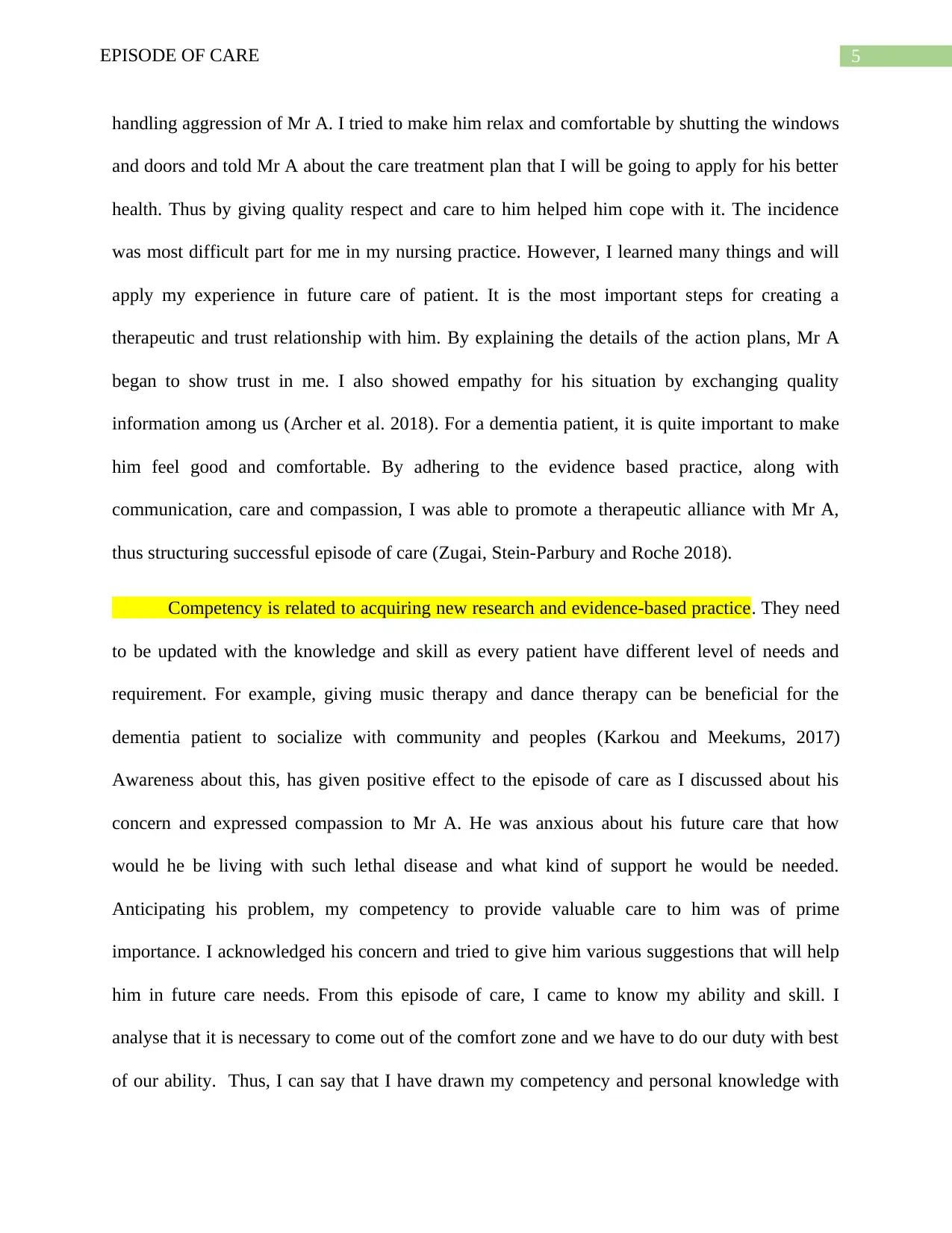
5EPISODE OF CARE
handling aggression of Mr A. I tried to make him relax and comfortable by shutting the windows
and doors and told Mr A about the care treatment plan that I will be going to apply for his better
health. Thus by giving quality respect and care to him helped him cope with it. The incidence
was most difficult part for me in my nursing practice. However, I learned many things and will
apply my experience in future care of patient. It is the most important steps for creating a
therapeutic and trust relationship with him. By explaining the details of the action plans, Mr A
began to show trust in me. I also showed empathy for his situation by exchanging quality
information among us (Archer et al. 2018). For a dementia patient, it is quite important to make
him feel good and comfortable. By adhering to the evidence based practice, along with
communication, care and compassion, I was able to promote a therapeutic alliance with Mr A,
thus structuring successful episode of care (Zugai, Stein‐Parbury and Roche 2018).
Competency is related to acquiring new research and evidence-based practice. They need
to be updated with the knowledge and skill as every patient have different level of needs and
requirement. For example, giving music therapy and dance therapy can be beneficial for the
dementia patient to socialize with community and peoples (Karkou and Meekums, 2017)
Awareness about this, has given positive effect to the episode of care as I discussed about his
concern and expressed compassion to Mr A. He was anxious about his future care that how
would he be living with such lethal disease and what kind of support he would be needed.
Anticipating his problem, my competency to provide valuable care to him was of prime
importance. I acknowledged his concern and tried to give him various suggestions that will help
him in future care needs. From this episode of care, I came to know my ability and skill. I
analyse that it is necessary to come out of the comfort zone and we have to do our duty with best
of our ability. Thus, I can say that I have drawn my competency and personal knowledge with
handling aggression of Mr A. I tried to make him relax and comfortable by shutting the windows
and doors and told Mr A about the care treatment plan that I will be going to apply for his better
health. Thus by giving quality respect and care to him helped him cope with it. The incidence
was most difficult part for me in my nursing practice. However, I learned many things and will
apply my experience in future care of patient. It is the most important steps for creating a
therapeutic and trust relationship with him. By explaining the details of the action plans, Mr A
began to show trust in me. I also showed empathy for his situation by exchanging quality
information among us (Archer et al. 2018). For a dementia patient, it is quite important to make
him feel good and comfortable. By adhering to the evidence based practice, along with
communication, care and compassion, I was able to promote a therapeutic alliance with Mr A,
thus structuring successful episode of care (Zugai, Stein‐Parbury and Roche 2018).
Competency is related to acquiring new research and evidence-based practice. They need
to be updated with the knowledge and skill as every patient have different level of needs and
requirement. For example, giving music therapy and dance therapy can be beneficial for the
dementia patient to socialize with community and peoples (Karkou and Meekums, 2017)
Awareness about this, has given positive effect to the episode of care as I discussed about his
concern and expressed compassion to Mr A. He was anxious about his future care that how
would he be living with such lethal disease and what kind of support he would be needed.
Anticipating his problem, my competency to provide valuable care to him was of prime
importance. I acknowledged his concern and tried to give him various suggestions that will help
him in future care needs. From this episode of care, I came to know my ability and skill. I
analyse that it is necessary to come out of the comfort zone and we have to do our duty with best
of our ability. Thus, I can say that I have drawn my competency and personal knowledge with
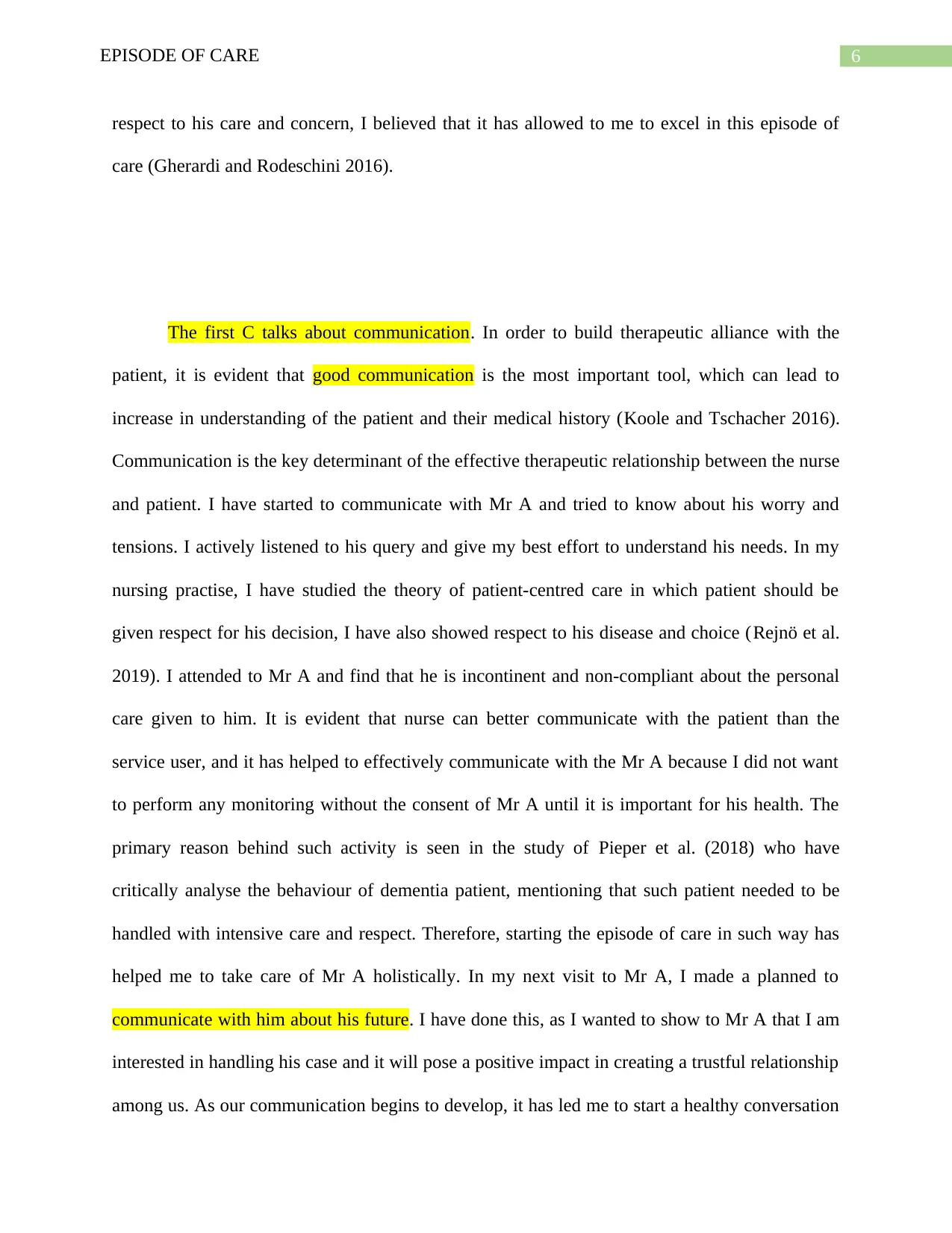
6EPISODE OF CARE
respect to his care and concern, I believed that it has allowed to me to excel in this episode of
care (Gherardi and Rodeschini 2016).
The first C talks about communication. In order to build therapeutic alliance with the
patient, it is evident that good communication is the most important tool, which can lead to
increase in understanding of the patient and their medical history (Koole and Tschacher 2016).
Communication is the key determinant of the effective therapeutic relationship between the nurse
and patient. I have started to communicate with Mr A and tried to know about his worry and
tensions. I actively listened to his query and give my best effort to understand his needs. In my
nursing practise, I have studied the theory of patient-centred care in which patient should be
given respect for his decision, I have also showed respect to his disease and choice (Rejnö et al.
2019). I attended to Mr A and find that he is incontinent and non-compliant about the personal
care given to him. It is evident that nurse can better communicate with the patient than the
service user, and it has helped to effectively communicate with the Mr A because I did not want
to perform any monitoring without the consent of Mr A until it is important for his health. The
primary reason behind such activity is seen in the study of Pieper et al. (2018) who have
critically analyse the behaviour of dementia patient, mentioning that such patient needed to be
handled with intensive care and respect. Therefore, starting the episode of care in such way has
helped me to take care of Mr A holistically. In my next visit to Mr A, I made a planned to
communicate with him about his future. I have done this, as I wanted to show to Mr A that I am
interested in handling his case and it will pose a positive impact in creating a trustful relationship
among us. As our communication begins to develop, it has led me to start a healthy conversation
respect to his care and concern, I believed that it has allowed to me to excel in this episode of
care (Gherardi and Rodeschini 2016).
The first C talks about communication. In order to build therapeutic alliance with the
patient, it is evident that good communication is the most important tool, which can lead to
increase in understanding of the patient and their medical history (Koole and Tschacher 2016).
Communication is the key determinant of the effective therapeutic relationship between the nurse
and patient. I have started to communicate with Mr A and tried to know about his worry and
tensions. I actively listened to his query and give my best effort to understand his needs. In my
nursing practise, I have studied the theory of patient-centred care in which patient should be
given respect for his decision, I have also showed respect to his disease and choice (Rejnö et al.
2019). I attended to Mr A and find that he is incontinent and non-compliant about the personal
care given to him. It is evident that nurse can better communicate with the patient than the
service user, and it has helped to effectively communicate with the Mr A because I did not want
to perform any monitoring without the consent of Mr A until it is important for his health. The
primary reason behind such activity is seen in the study of Pieper et al. (2018) who have
critically analyse the behaviour of dementia patient, mentioning that such patient needed to be
handled with intensive care and respect. Therefore, starting the episode of care in such way has
helped me to take care of Mr A holistically. In my next visit to Mr A, I made a planned to
communicate with him about his future. I have done this, as I wanted to show to Mr A that I am
interested in handling his case and it will pose a positive impact in creating a trustful relationship
among us. As our communication begins to develop, it has led me to start a healthy conversation
Paraphrase This Document
Need a fresh take? Get an instant paraphrase of this document with our AI Paraphraser
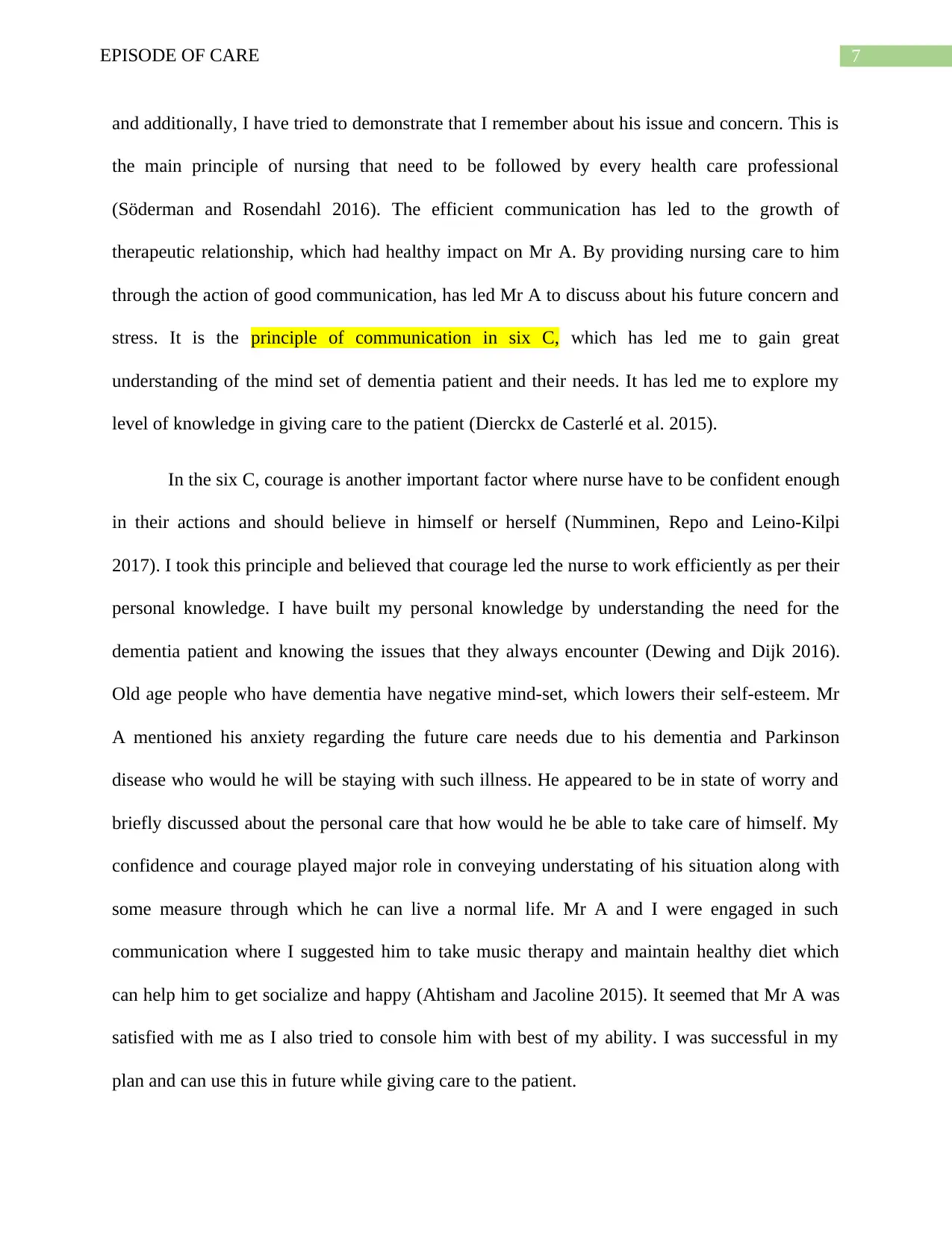
7EPISODE OF CARE
and additionally, I have tried to demonstrate that I remember about his issue and concern. This is
the main principle of nursing that need to be followed by every health care professional
(Söderman and Rosendahl 2016). The efficient communication has led to the growth of
therapeutic relationship, which had healthy impact on Mr A. By providing nursing care to him
through the action of good communication, has led Mr A to discuss about his future concern and
stress. It is the principle of communication in six C, which has led me to gain great
understanding of the mind set of dementia patient and their needs. It has led me to explore my
level of knowledge in giving care to the patient (Dierckx de Casterlé et al. 2015).
In the six C, courage is another important factor where nurse have to be confident enough
in their actions and should believe in himself or herself (Numminen, Repo and Leino-Kilpi
2017). I took this principle and believed that courage led the nurse to work efficiently as per their
personal knowledge. I have built my personal knowledge by understanding the need for the
dementia patient and knowing the issues that they always encounter (Dewing and Dijk 2016).
Old age people who have dementia have negative mind-set, which lowers their self-esteem. Mr
A mentioned his anxiety regarding the future care needs due to his dementia and Parkinson
disease who would he will be staying with such illness. He appeared to be in state of worry and
briefly discussed about the personal care that how would he be able to take care of himself. My
confidence and courage played major role in conveying understating of his situation along with
some measure through which he can live a normal life. Mr A and I were engaged in such
communication where I suggested him to take music therapy and maintain healthy diet which
can help him to get socialize and happy (Ahtisham and Jacoline 2015). It seemed that Mr A was
satisfied with me as I also tried to console him with best of my ability. I was successful in my
plan and can use this in future while giving care to the patient.
and additionally, I have tried to demonstrate that I remember about his issue and concern. This is
the main principle of nursing that need to be followed by every health care professional
(Söderman and Rosendahl 2016). The efficient communication has led to the growth of
therapeutic relationship, which had healthy impact on Mr A. By providing nursing care to him
through the action of good communication, has led Mr A to discuss about his future concern and
stress. It is the principle of communication in six C, which has led me to gain great
understanding of the mind set of dementia patient and their needs. It has led me to explore my
level of knowledge in giving care to the patient (Dierckx de Casterlé et al. 2015).
In the six C, courage is another important factor where nurse have to be confident enough
in their actions and should believe in himself or herself (Numminen, Repo and Leino-Kilpi
2017). I took this principle and believed that courage led the nurse to work efficiently as per their
personal knowledge. I have built my personal knowledge by understanding the need for the
dementia patient and knowing the issues that they always encounter (Dewing and Dijk 2016).
Old age people who have dementia have negative mind-set, which lowers their self-esteem. Mr
A mentioned his anxiety regarding the future care needs due to his dementia and Parkinson
disease who would he will be staying with such illness. He appeared to be in state of worry and
briefly discussed about the personal care that how would he be able to take care of himself. My
confidence and courage played major role in conveying understating of his situation along with
some measure through which he can live a normal life. Mr A and I were engaged in such
communication where I suggested him to take music therapy and maintain healthy diet which
can help him to get socialize and happy (Ahtisham and Jacoline 2015). It seemed that Mr A was
satisfied with me as I also tried to console him with best of my ability. I was successful in my
plan and can use this in future while giving care to the patient.
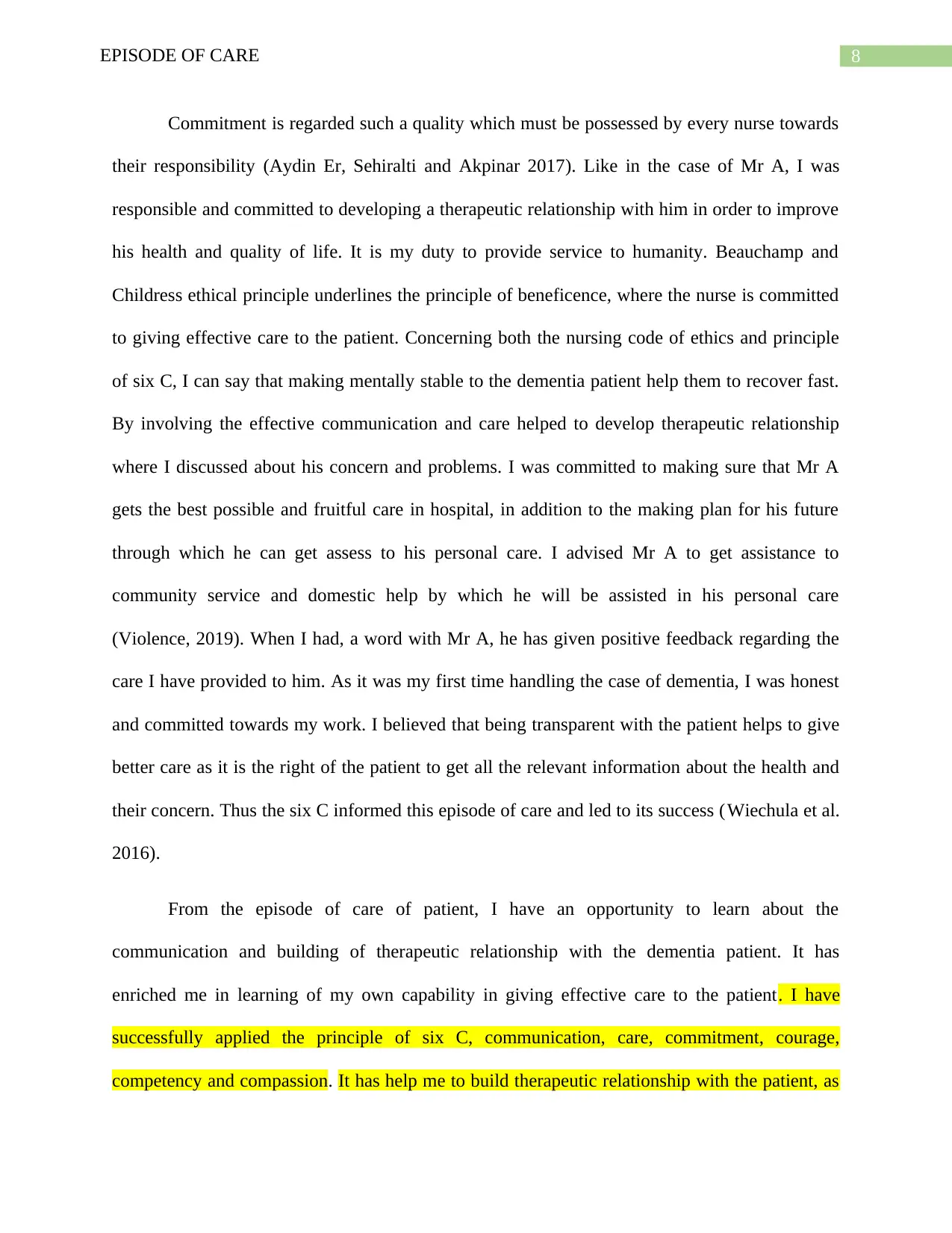
8EPISODE OF CARE
Commitment is regarded such a quality which must be possessed by every nurse towards
their responsibility (Aydin Er, Sehiralti and Akpinar 2017). Like in the case of Mr A, I was
responsible and committed to developing a therapeutic relationship with him in order to improve
his health and quality of life. It is my duty to provide service to humanity. Beauchamp and
Childress ethical principle underlines the principle of beneficence, where the nurse is committed
to giving effective care to the patient. Concerning both the nursing code of ethics and principle
of six C, I can say that making mentally stable to the dementia patient help them to recover fast.
By involving the effective communication and care helped to develop therapeutic relationship
where I discussed about his concern and problems. I was committed to making sure that Mr A
gets the best possible and fruitful care in hospital, in addition to the making plan for his future
through which he can get assess to his personal care. I advised Mr A to get assistance to
community service and domestic help by which he will be assisted in his personal care
(Violence, 2019). When I had, a word with Mr A, he has given positive feedback regarding the
care I have provided to him. As it was my first time handling the case of dementia, I was honest
and committed towards my work. I believed that being transparent with the patient helps to give
better care as it is the right of the patient to get all the relevant information about the health and
their concern. Thus the six C informed this episode of care and led to its success ( Wiechula et al.
2016).
From the episode of care of patient, I have an opportunity to learn about the
communication and building of therapeutic relationship with the dementia patient. It has
enriched me in learning of my own capability in giving effective care to the patient. I have
successfully applied the principle of six C, communication, care, commitment, courage,
competency and compassion. It has help me to build therapeutic relationship with the patient, as
Commitment is regarded such a quality which must be possessed by every nurse towards
their responsibility (Aydin Er, Sehiralti and Akpinar 2017). Like in the case of Mr A, I was
responsible and committed to developing a therapeutic relationship with him in order to improve
his health and quality of life. It is my duty to provide service to humanity. Beauchamp and
Childress ethical principle underlines the principle of beneficence, where the nurse is committed
to giving effective care to the patient. Concerning both the nursing code of ethics and principle
of six C, I can say that making mentally stable to the dementia patient help them to recover fast.
By involving the effective communication and care helped to develop therapeutic relationship
where I discussed about his concern and problems. I was committed to making sure that Mr A
gets the best possible and fruitful care in hospital, in addition to the making plan for his future
through which he can get assess to his personal care. I advised Mr A to get assistance to
community service and domestic help by which he will be assisted in his personal care
(Violence, 2019). When I had, a word with Mr A, he has given positive feedback regarding the
care I have provided to him. As it was my first time handling the case of dementia, I was honest
and committed towards my work. I believed that being transparent with the patient helps to give
better care as it is the right of the patient to get all the relevant information about the health and
their concern. Thus the six C informed this episode of care and led to its success ( Wiechula et al.
2016).
From the episode of care of patient, I have an opportunity to learn about the
communication and building of therapeutic relationship with the dementia patient. It has
enriched me in learning of my own capability in giving effective care to the patient. I have
successfully applied the principle of six C, communication, care, commitment, courage,
competency and compassion. It has help me to build therapeutic relationship with the patient, as
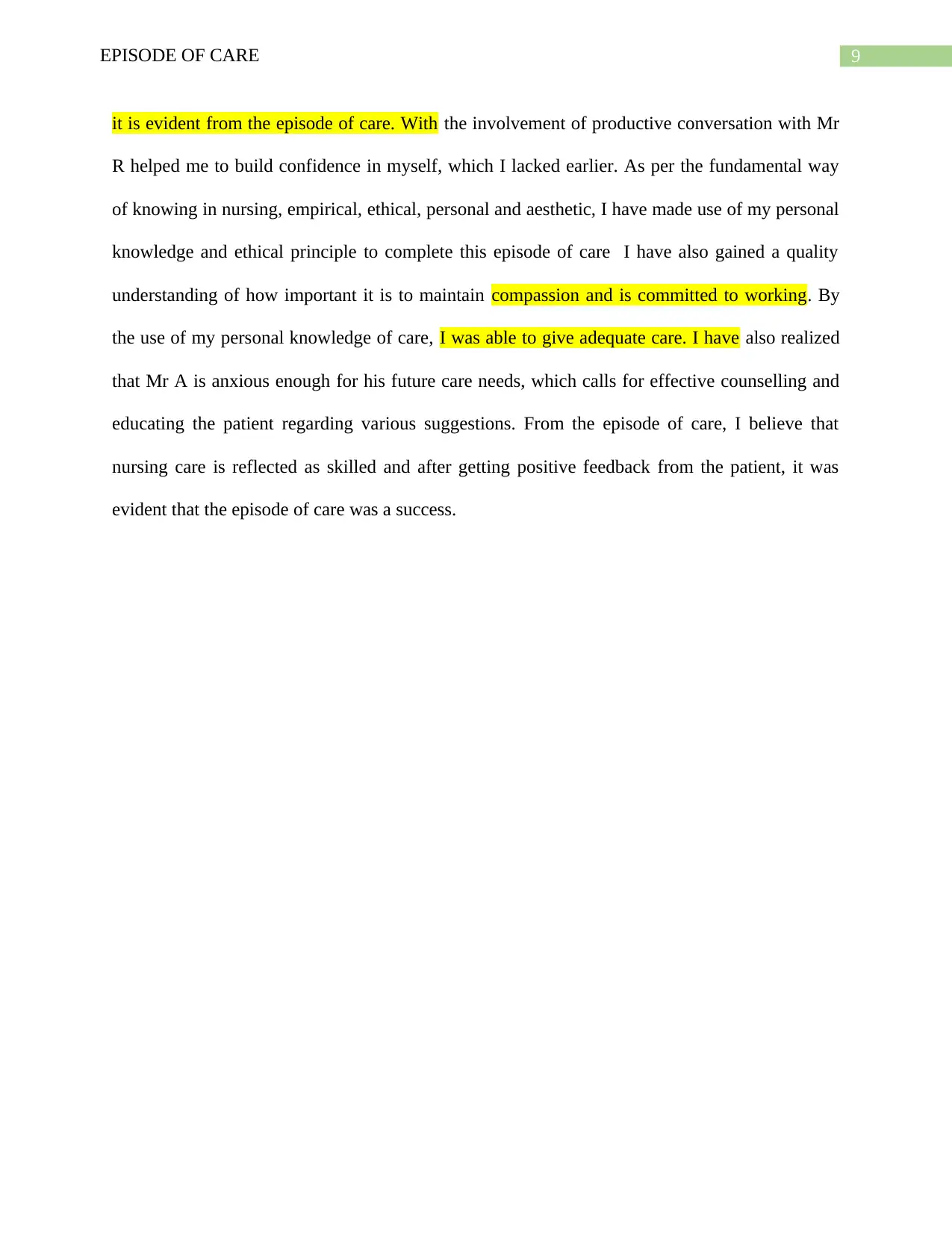
9EPISODE OF CARE
it is evident from the episode of care. With the involvement of productive conversation with Mr
R helped me to build confidence in myself, which I lacked earlier. As per the fundamental way
of knowing in nursing, empirical, ethical, personal and aesthetic, I have made use of my personal
knowledge and ethical principle to complete this episode of care I have also gained a quality
understanding of how important it is to maintain compassion and is committed to working. By
the use of my personal knowledge of care, I was able to give adequate care. I have also realized
that Mr A is anxious enough for his future care needs, which calls for effective counselling and
educating the patient regarding various suggestions. From the episode of care, I believe that
nursing care is reflected as skilled and after getting positive feedback from the patient, it was
evident that the episode of care was a success.
it is evident from the episode of care. With the involvement of productive conversation with Mr
R helped me to build confidence in myself, which I lacked earlier. As per the fundamental way
of knowing in nursing, empirical, ethical, personal and aesthetic, I have made use of my personal
knowledge and ethical principle to complete this episode of care I have also gained a quality
understanding of how important it is to maintain compassion and is committed to working. By
the use of my personal knowledge of care, I was able to give adequate care. I have also realized
that Mr A is anxious enough for his future care needs, which calls for effective counselling and
educating the patient regarding various suggestions. From the episode of care, I believe that
nursing care is reflected as skilled and after getting positive feedback from the patient, it was
evident that the episode of care was a success.
Secure Best Marks with AI Grader
Need help grading? Try our AI Grader for instant feedback on your assignments.
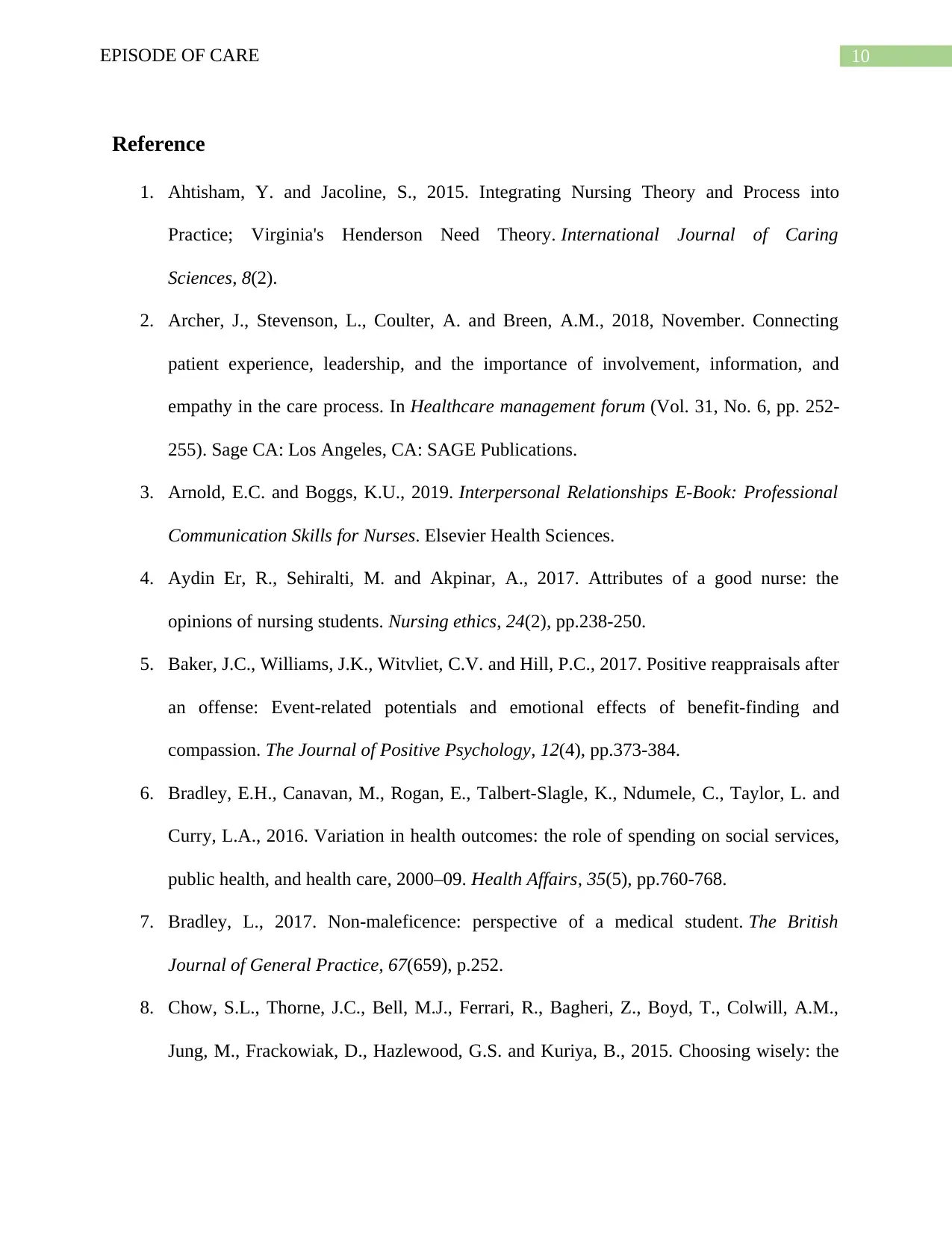
10EPISODE OF CARE
Reference
1. Ahtisham, Y. and Jacoline, S., 2015. Integrating Nursing Theory and Process into
Practice; Virginia's Henderson Need Theory. International Journal of Caring
Sciences, 8(2).
2. Archer, J., Stevenson, L., Coulter, A. and Breen, A.M., 2018, November. Connecting
patient experience, leadership, and the importance of involvement, information, and
empathy in the care process. In Healthcare management forum (Vol. 31, No. 6, pp. 252-
255). Sage CA: Los Angeles, CA: SAGE Publications.
3. Arnold, E.C. and Boggs, K.U., 2019. Interpersonal Relationships E-Book: Professional
Communication Skills for Nurses. Elsevier Health Sciences.
4. Aydin Er, R., Sehiralti, M. and Akpinar, A., 2017. Attributes of a good nurse: the
opinions of nursing students. Nursing ethics, 24(2), pp.238-250.
5. Baker, J.C., Williams, J.K., Witvliet, C.V. and Hill, P.C., 2017. Positive reappraisals after
an offense: Event-related potentials and emotional effects of benefit-finding and
compassion. The Journal of Positive Psychology, 12(4), pp.373-384.
6. Bradley, E.H., Canavan, M., Rogan, E., Talbert-Slagle, K., Ndumele, C., Taylor, L. and
Curry, L.A., 2016. Variation in health outcomes: the role of spending on social services,
public health, and health care, 2000–09. Health Affairs, 35(5), pp.760-768.
7. Bradley, L., 2017. Non-maleficence: perspective of a medical student. The British
Journal of General Practice, 67(659), p.252.
8. Chow, S.L., Thorne, J.C., Bell, M.J., Ferrari, R., Bagheri, Z., Boyd, T., Colwill, A.M.,
Jung, M., Frackowiak, D., Hazlewood, G.S. and Kuriya, B., 2015. Choosing wisely: the
Reference
1. Ahtisham, Y. and Jacoline, S., 2015. Integrating Nursing Theory and Process into
Practice; Virginia's Henderson Need Theory. International Journal of Caring
Sciences, 8(2).
2. Archer, J., Stevenson, L., Coulter, A. and Breen, A.M., 2018, November. Connecting
patient experience, leadership, and the importance of involvement, information, and
empathy in the care process. In Healthcare management forum (Vol. 31, No. 6, pp. 252-
255). Sage CA: Los Angeles, CA: SAGE Publications.
3. Arnold, E.C. and Boggs, K.U., 2019. Interpersonal Relationships E-Book: Professional
Communication Skills for Nurses. Elsevier Health Sciences.
4. Aydin Er, R., Sehiralti, M. and Akpinar, A., 2017. Attributes of a good nurse: the
opinions of nursing students. Nursing ethics, 24(2), pp.238-250.
5. Baker, J.C., Williams, J.K., Witvliet, C.V. and Hill, P.C., 2017. Positive reappraisals after
an offense: Event-related potentials and emotional effects of benefit-finding and
compassion. The Journal of Positive Psychology, 12(4), pp.373-384.
6. Bradley, E.H., Canavan, M., Rogan, E., Talbert-Slagle, K., Ndumele, C., Taylor, L. and
Curry, L.A., 2016. Variation in health outcomes: the role of spending on social services,
public health, and health care, 2000–09. Health Affairs, 35(5), pp.760-768.
7. Bradley, L., 2017. Non-maleficence: perspective of a medical student. The British
Journal of General Practice, 67(659), p.252.
8. Chow, S.L., Thorne, J.C., Bell, M.J., Ferrari, R., Bagheri, Z., Boyd, T., Colwill, A.M.,
Jung, M., Frackowiak, D., Hazlewood, G.S. and Kuriya, B., 2015. Choosing wisely: the
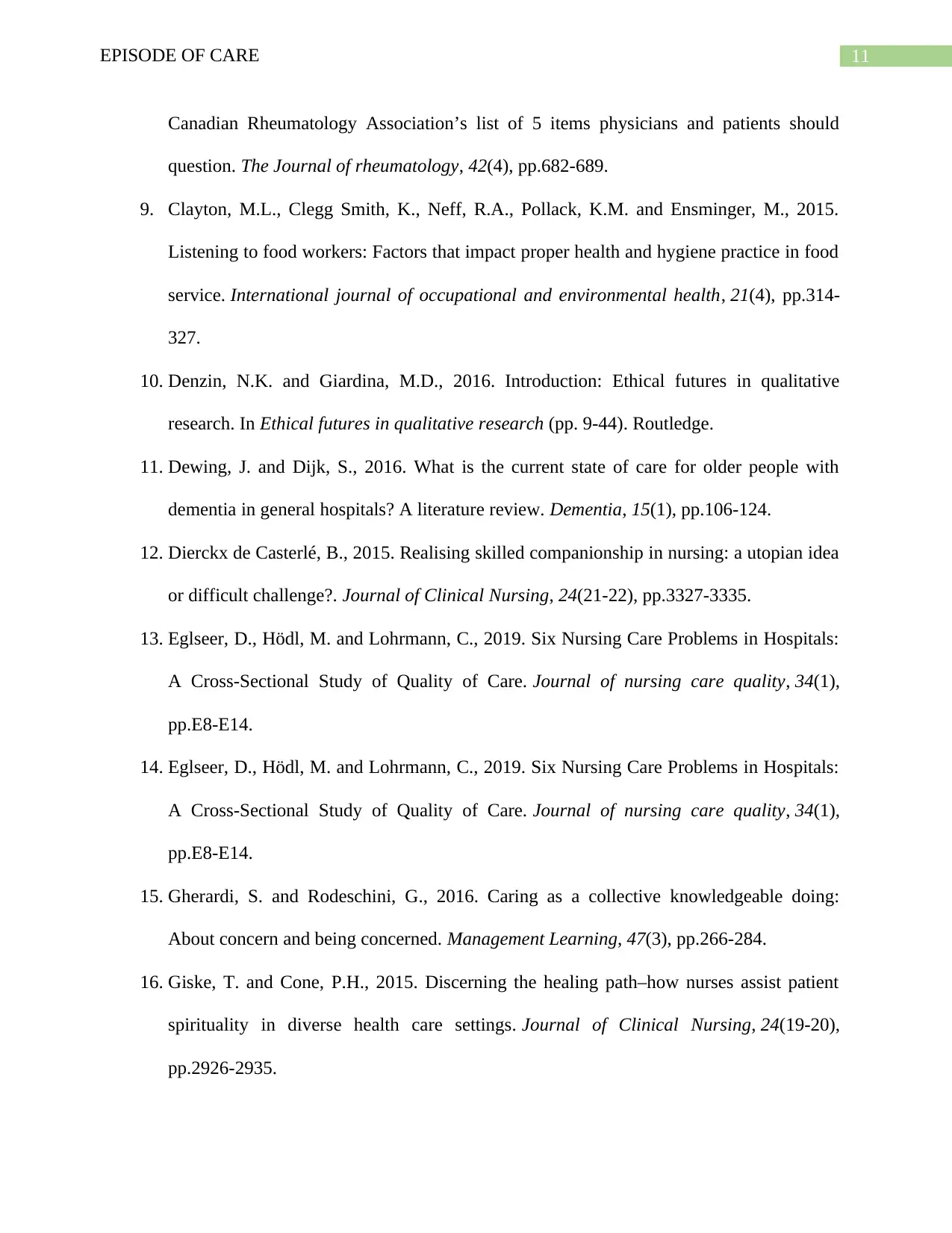
11EPISODE OF CARE
Canadian Rheumatology Association’s list of 5 items physicians and patients should
question. The Journal of rheumatology, 42(4), pp.682-689.
9. Clayton, M.L., Clegg Smith, K., Neff, R.A., Pollack, K.M. and Ensminger, M., 2015.
Listening to food workers: Factors that impact proper health and hygiene practice in food
service. International journal of occupational and environmental health, 21(4), pp.314-
327.
10. Denzin, N.K. and Giardina, M.D., 2016. Introduction: Ethical futures in qualitative
research. In Ethical futures in qualitative research (pp. 9-44). Routledge.
11. Dewing, J. and Dijk, S., 2016. What is the current state of care for older people with
dementia in general hospitals? A literature review. Dementia, 15(1), pp.106-124.
12. Dierckx de Casterlé, B., 2015. Realising skilled companionship in nursing: a utopian idea
or difficult challenge?. Journal of Clinical Nursing, 24(21-22), pp.3327-3335.
13. Eglseer, D., Hödl, M. and Lohrmann, C., 2019. Six Nursing Care Problems in Hospitals:
A Cross-Sectional Study of Quality of Care. Journal of nursing care quality, 34(1),
pp.E8-E14.
14. Eglseer, D., Hödl, M. and Lohrmann, C., 2019. Six Nursing Care Problems in Hospitals:
A Cross-Sectional Study of Quality of Care. Journal of nursing care quality, 34(1),
pp.E8-E14.
15. Gherardi, S. and Rodeschini, G., 2016. Caring as a collective knowledgeable doing:
About concern and being concerned. Management Learning, 47(3), pp.266-284.
16. Giske, T. and Cone, P.H., 2015. Discerning the healing path–how nurses assist patient
spirituality in diverse health care settings. Journal of Clinical Nursing, 24(19-20),
pp.2926-2935.
Canadian Rheumatology Association’s list of 5 items physicians and patients should
question. The Journal of rheumatology, 42(4), pp.682-689.
9. Clayton, M.L., Clegg Smith, K., Neff, R.A., Pollack, K.M. and Ensminger, M., 2015.
Listening to food workers: Factors that impact proper health and hygiene practice in food
service. International journal of occupational and environmental health, 21(4), pp.314-
327.
10. Denzin, N.K. and Giardina, M.D., 2016. Introduction: Ethical futures in qualitative
research. In Ethical futures in qualitative research (pp. 9-44). Routledge.
11. Dewing, J. and Dijk, S., 2016. What is the current state of care for older people with
dementia in general hospitals? A literature review. Dementia, 15(1), pp.106-124.
12. Dierckx de Casterlé, B., 2015. Realising skilled companionship in nursing: a utopian idea
or difficult challenge?. Journal of Clinical Nursing, 24(21-22), pp.3327-3335.
13. Eglseer, D., Hödl, M. and Lohrmann, C., 2019. Six Nursing Care Problems in Hospitals:
A Cross-Sectional Study of Quality of Care. Journal of nursing care quality, 34(1),
pp.E8-E14.
14. Eglseer, D., Hödl, M. and Lohrmann, C., 2019. Six Nursing Care Problems in Hospitals:
A Cross-Sectional Study of Quality of Care. Journal of nursing care quality, 34(1),
pp.E8-E14.
15. Gherardi, S. and Rodeschini, G., 2016. Caring as a collective knowledgeable doing:
About concern and being concerned. Management Learning, 47(3), pp.266-284.
16. Giske, T. and Cone, P.H., 2015. Discerning the healing path–how nurses assist patient
spirituality in diverse health care settings. Journal of Clinical Nursing, 24(19-20),
pp.2926-2935.
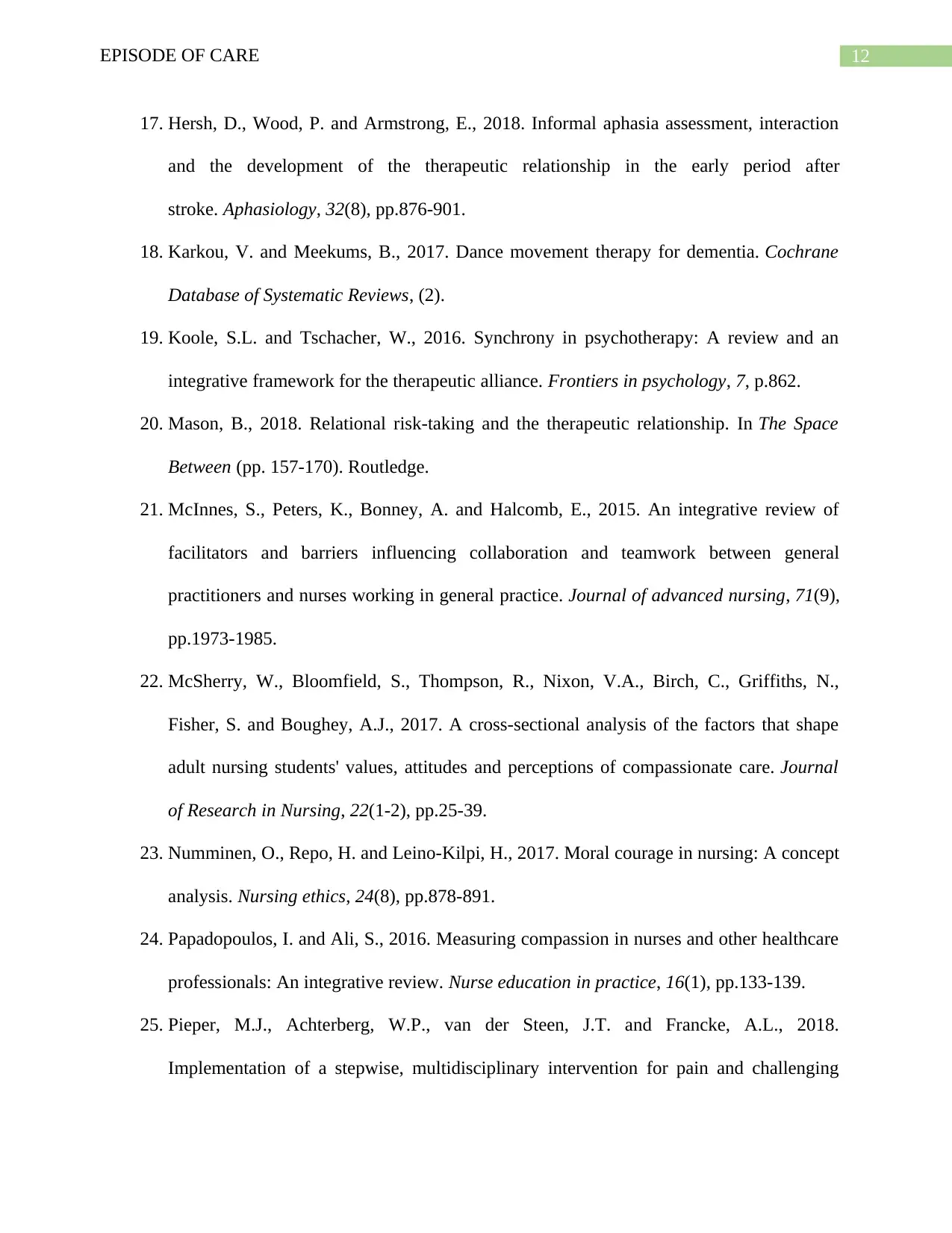
12EPISODE OF CARE
17. Hersh, D., Wood, P. and Armstrong, E., 2018. Informal aphasia assessment, interaction
and the development of the therapeutic relationship in the early period after
stroke. Aphasiology, 32(8), pp.876-901.
18. Karkou, V. and Meekums, B., 2017. Dance movement therapy for dementia. Cochrane
Database of Systematic Reviews, (2).
19. Koole, S.L. and Tschacher, W., 2016. Synchrony in psychotherapy: A review and an
integrative framework for the therapeutic alliance. Frontiers in psychology, 7, p.862.
20. Mason, B., 2018. Relational risk-taking and the therapeutic relationship. In The Space
Between (pp. 157-170). Routledge.
21. McInnes, S., Peters, K., Bonney, A. and Halcomb, E., 2015. An integrative review of
facilitators and barriers influencing collaboration and teamwork between general
practitioners and nurses working in general practice. Journal of advanced nursing, 71(9),
pp.1973-1985.
22. McSherry, W., Bloomfield, S., Thompson, R., Nixon, V.A., Birch, C., Griffiths, N.,
Fisher, S. and Boughey, A.J., 2017. A cross-sectional analysis of the factors that shape
adult nursing students' values, attitudes and perceptions of compassionate care. Journal
of Research in Nursing, 22(1-2), pp.25-39.
23. Numminen, O., Repo, H. and Leino-Kilpi, H., 2017. Moral courage in nursing: A concept
analysis. Nursing ethics, 24(8), pp.878-891.
24. Papadopoulos, I. and Ali, S., 2016. Measuring compassion in nurses and other healthcare
professionals: An integrative review. Nurse education in practice, 16(1), pp.133-139.
25. Pieper, M.J., Achterberg, W.P., van der Steen, J.T. and Francke, A.L., 2018.
Implementation of a stepwise, multidisciplinary intervention for pain and challenging
17. Hersh, D., Wood, P. and Armstrong, E., 2018. Informal aphasia assessment, interaction
and the development of the therapeutic relationship in the early period after
stroke. Aphasiology, 32(8), pp.876-901.
18. Karkou, V. and Meekums, B., 2017. Dance movement therapy for dementia. Cochrane
Database of Systematic Reviews, (2).
19. Koole, S.L. and Tschacher, W., 2016. Synchrony in psychotherapy: A review and an
integrative framework for the therapeutic alliance. Frontiers in psychology, 7, p.862.
20. Mason, B., 2018. Relational risk-taking and the therapeutic relationship. In The Space
Between (pp. 157-170). Routledge.
21. McInnes, S., Peters, K., Bonney, A. and Halcomb, E., 2015. An integrative review of
facilitators and barriers influencing collaboration and teamwork between general
practitioners and nurses working in general practice. Journal of advanced nursing, 71(9),
pp.1973-1985.
22. McSherry, W., Bloomfield, S., Thompson, R., Nixon, V.A., Birch, C., Griffiths, N.,
Fisher, S. and Boughey, A.J., 2017. A cross-sectional analysis of the factors that shape
adult nursing students' values, attitudes and perceptions of compassionate care. Journal
of Research in Nursing, 22(1-2), pp.25-39.
23. Numminen, O., Repo, H. and Leino-Kilpi, H., 2017. Moral courage in nursing: A concept
analysis. Nursing ethics, 24(8), pp.878-891.
24. Papadopoulos, I. and Ali, S., 2016. Measuring compassion in nurses and other healthcare
professionals: An integrative review. Nurse education in practice, 16(1), pp.133-139.
25. Pieper, M.J., Achterberg, W.P., van der Steen, J.T. and Francke, A.L., 2018.
Implementation of a stepwise, multidisciplinary intervention for pain and challenging
Paraphrase This Document
Need a fresh take? Get an instant paraphrase of this document with our AI Paraphraser
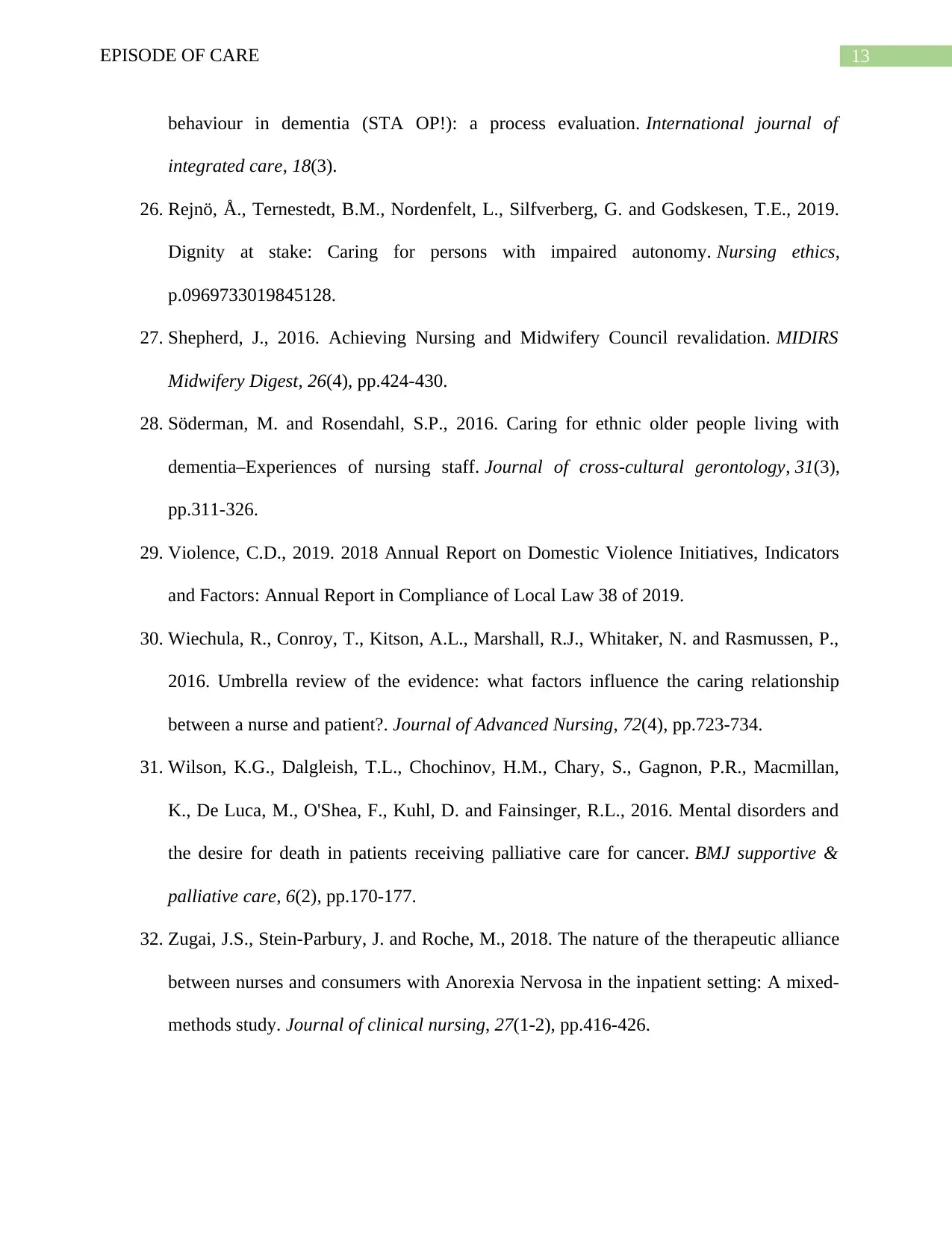
13EPISODE OF CARE
behaviour in dementia (STA OP!): a process evaluation. International journal of
integrated care, 18(3).
26. Rejnö, Å., Ternestedt, B.M., Nordenfelt, L., Silfverberg, G. and Godskesen, T.E., 2019.
Dignity at stake: Caring for persons with impaired autonomy. Nursing ethics,
p.0969733019845128.
27. Shepherd, J., 2016. Achieving Nursing and Midwifery Council revalidation. MIDIRS
Midwifery Digest, 26(4), pp.424-430.
28. Söderman, M. and Rosendahl, S.P., 2016. Caring for ethnic older people living with
dementia–Experiences of nursing staff. Journal of cross-cultural gerontology, 31(3),
pp.311-326.
29. Violence, C.D., 2019. 2018 Annual Report on Domestic Violence Initiatives, Indicators
and Factors: Annual Report in Compliance of Local Law 38 of 2019.
30. Wiechula, R., Conroy, T., Kitson, A.L., Marshall, R.J., Whitaker, N. and Rasmussen, P.,
2016. Umbrella review of the evidence: what factors influence the caring relationship
between a nurse and patient?. Journal of Advanced Nursing, 72(4), pp.723-734.
31. Wilson, K.G., Dalgleish, T.L., Chochinov, H.M., Chary, S., Gagnon, P.R., Macmillan,
K., De Luca, M., O'Shea, F., Kuhl, D. and Fainsinger, R.L., 2016. Mental disorders and
the desire for death in patients receiving palliative care for cancer. BMJ supportive &
palliative care, 6(2), pp.170-177.
32. Zugai, J.S., Stein‐Parbury, J. and Roche, M., 2018. The nature of the therapeutic alliance
between nurses and consumers with Anorexia Nervosa in the inpatient setting: A mixed‐
methods study. Journal of clinical nursing, 27(1-2), pp.416-426.
behaviour in dementia (STA OP!): a process evaluation. International journal of
integrated care, 18(3).
26. Rejnö, Å., Ternestedt, B.M., Nordenfelt, L., Silfverberg, G. and Godskesen, T.E., 2019.
Dignity at stake: Caring for persons with impaired autonomy. Nursing ethics,
p.0969733019845128.
27. Shepherd, J., 2016. Achieving Nursing and Midwifery Council revalidation. MIDIRS
Midwifery Digest, 26(4), pp.424-430.
28. Söderman, M. and Rosendahl, S.P., 2016. Caring for ethnic older people living with
dementia–Experiences of nursing staff. Journal of cross-cultural gerontology, 31(3),
pp.311-326.
29. Violence, C.D., 2019. 2018 Annual Report on Domestic Violence Initiatives, Indicators
and Factors: Annual Report in Compliance of Local Law 38 of 2019.
30. Wiechula, R., Conroy, T., Kitson, A.L., Marshall, R.J., Whitaker, N. and Rasmussen, P.,
2016. Umbrella review of the evidence: what factors influence the caring relationship
between a nurse and patient?. Journal of Advanced Nursing, 72(4), pp.723-734.
31. Wilson, K.G., Dalgleish, T.L., Chochinov, H.M., Chary, S., Gagnon, P.R., Macmillan,
K., De Luca, M., O'Shea, F., Kuhl, D. and Fainsinger, R.L., 2016. Mental disorders and
the desire for death in patients receiving palliative care for cancer. BMJ supportive &
palliative care, 6(2), pp.170-177.
32. Zugai, J.S., Stein‐Parbury, J. and Roche, M., 2018. The nature of the therapeutic alliance
between nurses and consumers with Anorexia Nervosa in the inpatient setting: A mixed‐
methods study. Journal of clinical nursing, 27(1-2), pp.416-426.
1 out of 14
Your All-in-One AI-Powered Toolkit for Academic Success.
+13062052269
info@desklib.com
Available 24*7 on WhatsApp / Email
![[object Object]](/_next/static/media/star-bottom.7253800d.svg)
Unlock your academic potential
© 2024 | Zucol Services PVT LTD | All rights reserved.


